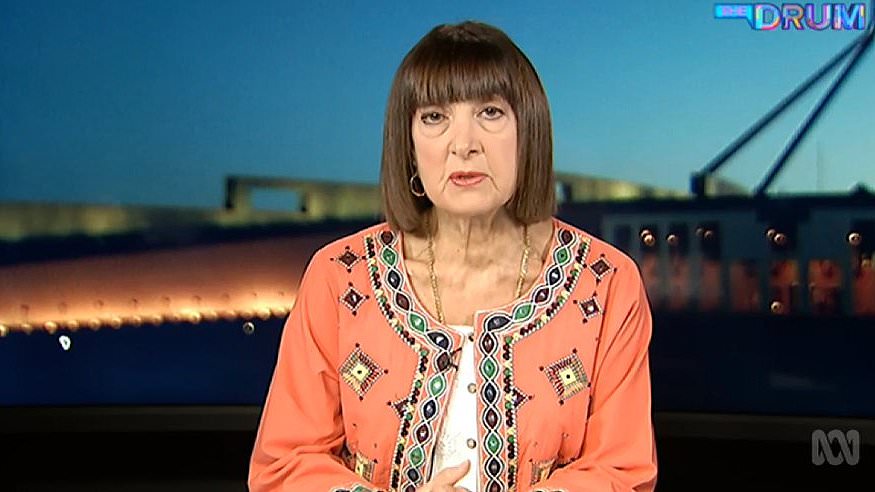One of the best connected political operatives in has claimed the Liberal Party is on the brink of extinction following its landslide defeat at the May 3 federal election.
Niki Savva – newspaper columnist and regular commentator on the ABC’s Insiders show – issued the dire warning while speaking at the Sydney Writers’ Festival in Town Hall on Saturday.
Fellow panelists Waleed Aly, George Megalogenis and Amy Remeikis joined Savva as she described the Liberals electoral wipeout as an ‘unmitigated disaster’.
‘The way things have turned out, the Liberal Party is on the brink of extinction,’ Savva said.
‘They have spent the last ten years moving further and further to the right, trying to appease an ageing ultra-conservative base.
‘If the Liberal Party doesn’t change, it will die. If it continues to go on this path, then it will no longer cease to exist as a mainstream political party.’
Once a Liberal insider as Peter Costello’s press secretary, Savva and her husband Vincent Woolcock sided with the centrist wing of the Liberals led by Malcolm Turnbull against the right led by Tony Abbott and his former chief-of-staff Peta Credlin, as they battled for control of the party.
The defeat of Peter Dutton and the election of Sussan Ley as Liberal leader has seen the balance of power within the party swing back to the centrists.
Labor claimed 94 seats at the election, while the Coalition took just 43. The Liberals also lost their leader Peter Dutton when voters in his electorate of Dickson swung towards Labor candidate, Ali France.
Aly supported Savva’s argument, blaming the party’s failings on walking away from a focus on economics and getting involved in the ‘culture wars’.
‘When Niki talks about the Liberal Party being on the brink of extinction, she’s not being melodramatic,’ he said.
‘What’s happened is liberal economics ceased to be the organising principle (of the party).’
Aly said the Liberal Party of old ‘wouldn’t really do the culture-warring in the way that we’ve come to know’.
‘John Howard was, I think, brilliant at resolving this contradiction by saying, “I’ll give you Liberal economics, even with the uncertainties that that has inherent in it … but I’ll then re-securitise you through the politics of culture, nation, national identity”.’
Dutton weighed in on a number of ‘culture war’ topics in the lead up to May 3.
He slammed ‘woke’ agendas in the nation’s school systems and also announced he would only stand in front of the n flag – rather than including the Indigenous and Torres Strait Islander flags as Anthony Albanese does.
Dutton also criticised the number of Welcome to Country ceremonies held at public events and ceremonies.
Aly claimed the party’s stance on migration was also partially to blame for declining votes in outer-city seats.
Dutton at one point promised to reduce net migration to 160,000 people in his first year if elected.
The former member for Dickson promised to slash permanent migration from 185,000 in 2024-25 to 140,000 in 2025-26.
Aly claimed the Liberals have long alienated minorities – driving his own late father, a Liberal-supporting business owner, from the party decades ago.
‘You have a situation where all these minorities – and I’m not into the whole identity politics, analysis of things – but all these minorities, having been alienated repeatedly, over and over a long period of time, haven’t come back to (the party),’ Aly said.
Political analyst and left-wing commentator Remeikis, from the Institute, said the election was a grave sign of things to come for the party.
‘I don’t just think that the Liberal Party is heading to extinction; I think this is the death notice,’ she said.
‘This is the last gasp of the Liberal Party.
‘And I think it’s coming up to the last gasp of the two party system in , which has basically been the foundation of our democracy since the post-war.
‘And the reason I say that is that the Liberals have lost most of their blue ribbon seats.’
Remeikis said the Coalition was not likely to win the next election, and wouldn’t have a chance ‘until 2030’.
‘We’ve got at least six years of the Labor government ahead of us,’ she said.
‘By the time the Coalition, if it still exists – if the Liberal Party still exists, if the National Party still exists – are collectively competitive again, we’re in the 2030s.
‘Do you think anyone is talking about nuclear or the energy transition? Gee whiz. No. So (the parties are) completely irrelevant to these fights that they’re having.’
The commentators also criticised Dutton’s campaign style.
They labelled him ‘not match fit’ at press conferences, shambolic in his policy choice, and said Dutton’s attempt at softening his ‘hard man’ image only confused voters.
The ‘Trump effect’ also had a big impact on the election, the pundits added.
‘The Trump factor was kicking in around the world, and Trump was starting to be a drag on the right-wing ticket, wherever it was being tested,’ Cassidy said.
Aly said the effects of Trump’s policies in , including the tariffs, began to scare local voters.
‘What I think it ultimately happened was Trump came in petrified everybody, everyone who looked at his style of politics and thought, “oh, wow, this could be there could be real world consequences to this and as a collective”,’ he said.
Anthony Albanese delivered Labor its best election result since 1943, when John Curtin was wartime prime minister.
Robert Menzies formed the Liberal Party in 1944, following a devastating election defeat that had decimated the old United Party as a force in conservative politics.
